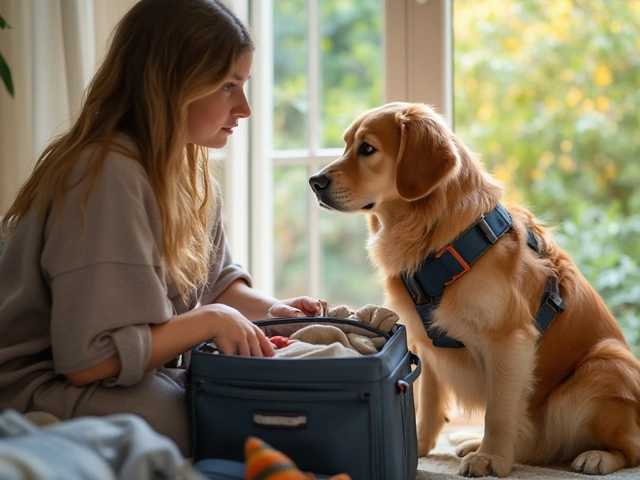Picture this: You're planning a wonderful trip with your furry companion, and the anticipation of exploring new scents and sights together is palpable. But did you know that certain states in the US are notorious for puppy mills, where our canine friends might not be having the same joyous experiences?
For those in the know, being aware of these areas can help make better-informed travel choices, particularly if animal welfare is at the forefront of your planning. As we highlight these concerning states, let's delve into how this information not only affects local environments but also shapes the broader landscape of ethical pet-friendly vacations.
- Understanding Puppy Mills and Their Impact
- States with High Concentrations of Puppy Mills
- Legal Efforts and State Regulations
- Why Puppy Mill Awareness Matters for Travelers
- Ethical Pet Travel Tips
- Promoting Responsible Pet Ownership
Understanding Puppy Mills and Their Impact
Puppy mills are commercial dog-breeding facilities that prioritize profit over the welfare of the animals they raise. These establishments often keep dogs in overcrowded and unsanitary conditions, lacking adequate space, nutrition, and medical care. At the heart of the issue is the poor treatment of puppy mills, where breeding dogs are confined to small cages for most of their lives, with barely enough space to turn around or lie down comfortably. The lack of social interaction and exercise can result in psychological distress and a range of behavioral problems. Tragically, many of these dogs end up suffering from preventable diseases and genetic disorders due to irresponsible breeding practices common in puppy mills.
Research conducted by animal welfare organizations indicates that thousands of puppy mills operate across the United States, producing over two million puppies each year. The Humane Society of the United States has been vocal in its fight against these operations, exposing the stark reality behind the seemingly playful puppies often seen in pet stores. As part of their advocacy, they highlight the adverse effects such facilities have on the dogs themselves and on public health. For instance, a breakdown of inspections by various state departments revealed violations ranging from inadequate veterinary care to improper sanitation methods, which can contribute to the spread of disease.
Although legislation exists to regulate commercial breeding facilities, the enforcement of these laws can be inconsistent. Some states have stricter regulations, but many still lack comprehensive standards and oversight. In areas where puppy mills thrive, the local economy is, unfortunately, often reliant on these operations. The lure of quick financial returns can be an obstacle to implementing tougher laws. Therefore, awareness and education become vital tools in empowering residents and visitors alike to push for change. By understanding the scope and impact of puppy mills, we can better advocate for the health and happiness of all dogs, shaping a future where humane and ethical breeding practices are the norm.
"The very traits that make dogs so adaptable and beloved as companions—their loyalty, sociability, and resilience—are exploited in puppy mills to meet consumer demand," says John Goodwin, senior director of the Humane Society's Stop Puppy Mills Campaign.States with High Concentrations of Puppy Mills
The term "puppy mill" evokes images of overcrowded cages, lack of care, and a general disregard for the well-being of dogs. Sadly, some states have gained notoriety for harboring such establishments. Understanding which areas are most affected is crucial for travelers wanting to make conscious decisions when planning a pet travel itinerary. Missouri, for instance, often tops the list of states with the most puppy mills, earning it the unenviable title of the 'Puppy Mill Capital of America.' Here, the struggle to regulate and shut down these operations is ongoing despite advances in legislation.
Neighboring states like Iowa and Ohio also feature prominently in reports detailing the prevalence of puppy mills. The reasons for their concentration vary, with lax regulations and enforcement often cited as key factors. Efforts to improve conditions have been met with varying levels of success and resistance, often clashing against economic interests of those involved in commercial dog breeding. Unfortunately, many of these puppies are sold to unsuspecting families across the country, disseminating issues related to unchecked breeding far beyond state borders.
A report from the Humane Society of the United States emphasized the extent of the issue.
“While we tirelessly work towards creating a nation where no healthy companion animal is euthanized for lack of a home, it is disheartening to see so many dogs endure poor conditions for profit,” said one of their spokespersons.Such sentiments are mirrored by many in the animal welfare community, highlighting an urgent need for systemic change at both state and national levels.Kansas and Arkansas, too, play their part in this troubling narrative. Despite significant public awareness campaigns, progress in curbing the operations of these inhumane facilities has been slow. The sheer number of puppy mill licenses issued in some areas underscores the challenge faced by those striving to improve the fate of these innocent animals. To effectively tackle the problem, awareness and legislative action must be better aligned, ensuring no loopholes are exploited by less scrupulous operators.
State Approx. Number of Puppy Mills Missouri Over 800 Iowa Over 400 Ohio Over 300 These statistics are more than just numbers—they represent the lives in the balance and underscore a significant ethical dilemma for travelers interested in dog-friendly holidays. By choosing destinations more known for ethical animal treatment, travelers can contribute to a gradual shift towards responsible pet tourism. Armed with this knowledge, perhaps you’ll find your next adventure awaits in a state celebrated for natural beauty and compassion alike.

Legal Efforts and State Regulations
The battle against puppy mills has not gone unnoticed, with numerous states across the U.S. implementing legal measures aimed at curtailing their prevalence. Yet, the effectiveness of these efforts varies dramatically. Some states like California have taken bold steps, prohibiting the sale of commercially bred dogs in pet stores unless obtained from a shelter or rescue organization. This measure aims to strike at the heart of puppy mills, cutting off a significant demand channel. On the other hand, states like Missouri continue to struggle, despite enacting laws to regulate breeding operations. Their regulations often fall short due to implementation challenges and resource constraints.
There's a growing awareness and determination among animal welfare advocates to press legislators for stronger laws. The Animal Welfare Act, enforced at the federal level, mandates certain minimum standards for dog breeders, but critics argue these are neither stringent nor comprehensive enough. Many states have their own laws to complement federal regulations, focusing on dimensions like facility conditions, breeding limits, and inspection frequency. Unfortunately, resistance often comes from strong agricultural lobbies that can stymie progress, arguing that increased regulation harms legitimate breeders.
"Effective legislation is key to eradicating puppy mills. Without firm laws and enforcement, it's impossible to eliminate these detrimental practices," – Humane Society representative.One of the critical issues with state regulations is the patchwork nature of the laws. While Illinois has robust breeder registration requirements and regular inspection routines, neighboring states may lack such stringent oversight, allowing unscrupulous breeders to simply relocate. This inconsistency can undermine broader enforcement efforts, requiring a federal-state partnership to create more uniform standards across the country.
Positive Trends and Continuing Challenges
Despite the challenges, there are positive shifts worth noting. The formation of task forces in several states serves as a beacon of hope. These bodies are responsible for tracking breeders, ensuring compliance, and taking decisive actions against infractions. The task forces typically include veterinarians, law enforcement officials, and legal experts. They've widely been credited for closing down numerous puppy mills and rescuing countless dogs.
However, the path to changing regulations is fraught with hurdles. Funding is a perennial concern, with many state agencies operating under budget constraints that limit their ability to perform thorough inspections or pursue legal actions against offenders. There's also a race against time, as puppy mills can operate with relative impunity until they are subject to a formal investigation, which can be delayed due to bureaucratic red tape.
In sum, while there are commendable strides in state legislatures aimed at reining in these controversial facilities, the journey is far from complete. Heightened public awareness, strategic advocacy, and continued pressure on lawmakers are essential for forging stronger legal frameworks that truly make puppy mills a relic of the past. As travelers seeking dog-friendly experiences, becoming informed citizens helps catalyze the necessary changes.
Why Puppy Mill Awareness Matters for Travelers
As we embark on journeys with our beloved pets, it's crucial to recognize how our travel choices can impact animal welfare. Awareness of puppy mills plays a vital role in shaping responsible tourism. Puppy mills, often hidden from plain sight, are large-scale breeding operations where dogs live in appalling conditions. These facilities prioritize profit over the health and well-being of the animals, leading to severe physical and behavioral issues in the dogs. As we navigate across states and enjoy pet-friendly destinations, understanding the presence of puppy mills allows us to make more ethical decisions, ensuring that our travels contribute positively to communities and their efforts to improve animal welfare.
While some might wonder how vacation plans are related to puppy mills, the connection is more robust than it appears at first glance. When travelers frequent areas with known puppy mill issues, they inadvertently support an economy that might be turning a blind eye to unethical breeding practices. The travel industry, influencing thousands of tourists every day, can serve as a powerful advocate for change. By understanding which states struggle the most with this issue, travelers can press for better laws and enforcement, raising awareness and supporting local businesses committed to ethical practices. According to the Humane Society of the United States, an estimated 10,000 puppy mills are operating in the US, breeding more than 2 million puppies annually in inhumane conditions.
"Closing puppy mills isn't just about preventing cruelty—it's about protecting families and their beloved four-legged members," said Sara Amundson, President of a reputable animal welfare organization.Puppy mill awareness can also significantly influence the tourism industry financially. Conscious travelers tend to favor establishments and destinations that align with their ethical beliefs, including respect for animal welfare. Pet-friendly accommodations, parks, and attractions that actively oppose puppy mills can attract a dedicated clientele, fostering a community centered around sustainability and compassion. Travelers educate others, shedding light on industries that contribute to this issue and supporting efforts that combat animal cruelty, thereby transforming awareness into actionable change.
Moreover, travelers aware of puppy mills have the power to become advocates themselves. They can engage in simple yet impactful actions, such as leaving reviews that highlight ethical practices, choosing accommodations that contribute to local animal welfare efforts, or donating to agencies working against puppy mills. A growing number of people are using platforms like social media to raise awareness, encouraging their followers to make informed travel decisions. These actions together create a ripple effect that can lead to better regulations and closure of unethical breeding centers. More states are beginning to recognize the potential impact tourism has on fostering a humane environment, prompting legislative changes and public support for stricter laws against puppy mills.
A profound sense of responsibility comes with being a pet parent or a loving animal companion. Traveling should not only be a joyous journey but also a commitment to promote compassionate practices everywhere we go. Being informed about and outspoken against puppy mills echoes into every aspect of travel, paving the way for both education and action, and allowing us to roam the world with a clean conscience.

Ethical Pet Travel Tips
When it comes to planning a trip with your canine companion, it’s important to ensure that your travel choices don't unintentionally support businesses or practices that contribute to the problem of puppy mills. As a responsible pet owner, the journey begins long before you hit the road. Research is key. Start by looking for pet-friendly accommodations that are transparent about their policies and practices, prioritizing those that actively support animal welfare. This might include choosing hotels or vacation rentals that partner with local shelters or have strict no-animal-cruelty policies in place.
Another way to be a more ethical traveler is by bringing along eco-friendly pet products. From biodegradable poop bags to sustainably sourced food, small choices can make a big difference. It’s worth noting that, according to the American Pet Products Association, an increasing number of pet owners are opting for sustainable products, reflecting a broader commitment to the environment and animal welfare. When buying supplies for your trip, check for certifications or labels that indicate the product's eco-friendly status.
During your travels, try to support local businesses that show genuine care for animals. This includes opting for local pet boutiques over big chains, which often offer products that sustain small-scale, humane farms rather than commercial breeders. In the same vein, consider engaging in activities that promote understanding and kindness toward animals. Instead of visiting zoos or aquariums that might not have the best conditions for animals, explore wildlife sanctuaries or natural parks where animals can live more freely and visitors can learn about conservation efforts.
"Being a responsible tourist means respecting the natural habitat and lives of other beings, ensuring that your presence is of no harm to them or their environment." - Jane GoodallIf you're visiting a state known for high puppy mill activity, you can contribute positively by volunteering a few hours at local shelters or participating in awareness events. Such moments provide a deeper connection with the community and can educate travelers on the harsh realities of puppy mills. Many people find that these experiences greatly enrich their travels, giving them a firsthand understanding of ongoing efforts and struggles in animal welfare.
Before purchasing any pet while traveling, be sure to verify the source. It’s important to remember that reputable breeders will always prioritize the well-being of their animals and will be upfront about their breeding practices. Never buy from breeders that seem suspicious or unwilling to let you see the animal's living conditions. Remember, adopting from a shelter or rescue is always a wonderful option if you're considering taking a new pet home. By engaging in mindful practices, we can help limit the influence of puppy mills and make a real difference, one trip at a time.
Promoting Responsible Pet Ownership
Owning a pet is not just about having a playful buddy to cuddle with; it's about taking responsibility for the well-being of another living being. This commitment encompasses a wide range of actions, from ensuring they receive adequate nutrition to making sure they are healthy and happy in their environment. Responsible pet ownership becomes even more critical when considering the broader impact of puppy mills, as these facilities often neglect basic animal welfare needs. Acknowledging the prevalence of puppy mills in certain states can encourage potential pet owners to seek out reputable sources and adopt rather than shop, a choice that undoubtedly makes a significant difference.
One fundamental aspect of responsible pet ownership is understanding the specific needs and instincts of different breeds. For instance, dogs from working breeds often require more exercise and mental stimulation than toy breeds. By tailoring care to their genetic predispositions, owners can prevent behavioral issues, which are sometimes used as excuses to abandon pets. This focus on individualized care enriches the lives of pets and their owners, fostering a deeper bond. Cultivating understanding and empathy can break cycles of neglect that puppy mills perpetuate and inspire a new way forward in responsible pet care.
Providing a nurturing home also means making informed decisions about healthcare. Regular vet checkups and vaccinations are vital to prevent diseases. Spaying and neutering are encouraged to control the pet population and avoid contributing to the overpopulation problem exacerbated by puppy mills. Statistics from the Humane Society of the United States show that approximately 2.4 million healthy, adoptable pets are euthanized in shelters each year due to lack of space, a stark reminder of the consequences of irresponsible breeding practices.
Moreover, responsible pet owners often advocate for legislative changes to enforce stricter regulations on puppy mills. These ethical consumers wield significant influence, as their choices drive demand away from inhumane operations and toward ethical breeders and adoption agencies. With increased public awareness and civic engagement, lawmakers feel more pressured to implement policies that protect animals from abuse. In the words of Jane Goodall, noted primatologist and animal rights advocate,
"You cannot get through a single day without having an impact on the world around you. What you do makes a difference, and you have to decide what kind of difference you want to make."Educating others is also key. Sharing knowledge about the ramifications of supporting industries with low welfare standards can inspire others to make conscientious choices. Workshops, community events, and social media campaigns are effective methods of spreading this crucial message. By fostering a community-focused on ethical treatment, animal lovers can make a lasting difference beyond their immediate circles. It is both a personal and collective responsibility to nurture a future where the term 'breed' is synonymous with care and compassion rather than commodification.
Ultimately, promoting responsible pet ownership is about weaving a tapestry of empathy, knowledge, and action. Pet owners should strive to be stewards of change by actively choosing compassion and responsibility in small and large ways. Whether it's adopting from a shelter, educating a friend, or lobbying for stricter laws, each action counts. By staying informed and purposeful, pet owners become advocates for their companions and all creatures mistreated by systems that prioritize profit over welfare. And by doing so, they ensure that their travels, no matter the destination, contribute positively to a more caring world.







